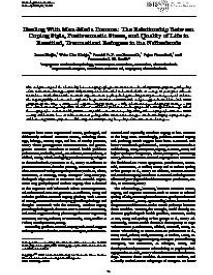Dealing with man-made trauma: The relationship between coping style, posttraumatic stress, and quality of life in resettled, traumatized refugees in the Netherlands
This study investigated the relationship between coping style, posttraumatic stress disorder (PTSD) symptoms, and quality of life in traumatized refugees (N = 335). Participants had resettled in the Netherlands on average 13 years prior and were referred to a Dutch clinic for the treatment of posttraumatic psychopathology resulting from persecution, war, and violence. The majority (85%) of the research sample met diagnostic criteria for PTSD. Path analysis suggested a model in which PTSD symptoms (P = -.61, p < .001), social support seeking (P = .12, p < .05), and emotion-focused coping (P = .13, p < .01) have a direct effect on quality of life. The role of avoidant and problem-focused coping could be interpreted in 2 ways. Either these coping styles are influenced by PTSD severity and have no effect on quality of life, or these coping styles influence PTSD severity and therefore have an indirect effect on quality of life. Intervention strategies aimed at modifying coping strategies and decreasing PTSD symptoms could be important in improving the quality of life of traumatized refugees.
Geachte bezoeker,
De informatie die u nu opvraagt, kan door psychotraumanet niet aan u worden getoond. Dit kan verschillende redenen hebben,
waarvan (bescherming van het) auteursrecht de meeste voorkomende is. Wanneer het mogelijk is om u door te verwijzen naar de bron
van deze informatie, dan ziet u hier onder een link naar die plek.
Als er geen link staat, kunt u contact opnemen met de bibliotheek,
die u verder op weg kan helpen.
Met vriendelijke groet,
Het psychotraumanet-team.
Reference:
Irene Huijts, Wim Chr. Kleijn, Arnold A.P. van Emmerik, Arjen Noordhof, & Annemarie J.M. Smith | 2012
In: Journal of Traumatic Stress, ISSN 0894-9867 | 25 | 1 | februari | 71–78
http://onlinelibrary.wiley.com/doi/10.1002/jts.21665/abstract;jsessionid=7B32F134A18C5D1C7FF08BB26D11F2B2.f04t02
In: Journal of Traumatic Stress, ISSN 0894-9867 | 25 | 1 | februari | 71–78
http://onlinelibrary.wiley.com/doi/10.1002/jts.21665/abstract;jsessionid=7B32F134A18C5D1C7FF08BB26D11F2B2.f04t02


